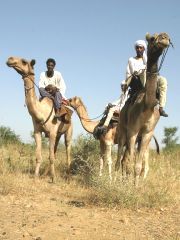Over 350 militiamen attack, destroy Darfur village – UN, AU
By EDITH M. LEDERER, Associated Press Writer
UNITED NATIONS, Apr 9, 2005 (AP) — More than 350 militiamen destroyed a village in Sudan’s conflict-wracked Darfur region in the worst attack since January, the United Nations and the African Union said.

|
|
Members of the Um Jalool, an Arab nomadic tribe alleged to be part of the Janjaweed militia, ride their camels 20 kilometers outside the village of Muhkjar in West Darfur, Oct 2004. (HRW) . |
A joint statement issued Friday by the top U.N. envoy in Sudan, Jan Pronk, and the top AU envoy, Baba Gana Kingibe said the names of the militia leader and his known collaborators will be turned over for possible U.N. sanctions and prosecution by the International Criminal Court.
The two organizations expressed “utter shock and disbelief” at Thursday’s daylong attack on the South Darfur village of Khor Abeche by armed militia from the Miseriyya tribe of Niteaga under the command of Nasir Al Tijani Adel Kaadir.
The statement said the names of Al Tijani and his known collaborators will be turned over to a U.N. Security Council committee charged with deciding which Sudanese are thwarting peace efforts and should be subject to a travel ban and asset freeze.
Last Thursday, the Security Council also voted to refer cases of alleged rape, murder, village burnings and other atrocities to the International Criminal Court, the world’s first permanent war crimes tribunal. On Tuesday, the United Nations handed prosecutors from the tribunal thousands of documents and a sealed list of 51 people to be investigated for alleged war crimes in Darfur.
Al Tijani is the first Sudanese publicly identified as a possible war crimes suspect.
According to the statement, more than 200 of Al Tijani’s militiamen, reinforced by 150 additional fighters from Niteaga, “rampaged through the village killing, burning and destroying everything in heir paths and leaving in their wake total destruction with only the mosque and the school spared.”
The statement did not give any casualty figures but said the attack was the most savage since the sacking of the South Darfur village of Hamada in January which killed about 100 people.
It was apparently in retaliation for the alleged theft of 150 cattle whose tracks were supposedly traced to Khor Abeche. But Al Tijani said it was also because rebels from the Sudan Liberation Army, who controlled the village, refused to turn over the bodies of two of his men, the statement said.
The United Nations and the African Union condemned the “senseless and premeditated savage attack” and said the destruction of Khor Abeche not only violated cease-fire agreements but Security Council resolutions calling for an end to fighting and demanding that the perpetrators of such attacks no longer enjoy impunity and are brought to justice.
In addition to possible U.N. action, the two organizations said they expect the Sudanese government to “take appropriate action against Al Tijani,” noting that he had repeatedly threatened to destroy Khor Abeche, in the presence of government officials.
The vast western Sudanese region of Darfur is the scene of one of the world’s worst humanitarian crises. An estimated 180,000 people have died in the upheaval — many from hunger and disease — and about 2 million others have been displaced since the conflict began in February 2003.
It erupted when rebels took up arms against what they saw as years of state neglect and discrimination against Sudanese of African origin. The government is accused of responding with a counterinsurgency campaign in which the Arab Janjaweed militia committed wide-scale abuses against the African population.
The African Union has 3,000 soldiers and observers in Darfur monitoring a cease-fire which has been repeatedly broken. The AU had been trying to deploy troops to Khor Abeche since April 3 to deter an attack but was prevented by what the statement called “deliberate official procrastination over the allocation of land for the troops’ accommodation.”
A U.N. commission concluded in January that crimes against humanity — but not genocide — occurred in Darfur and recommended that cases of alleged atrocities since July 1, 2002 be referred to the International Criminal Court.
